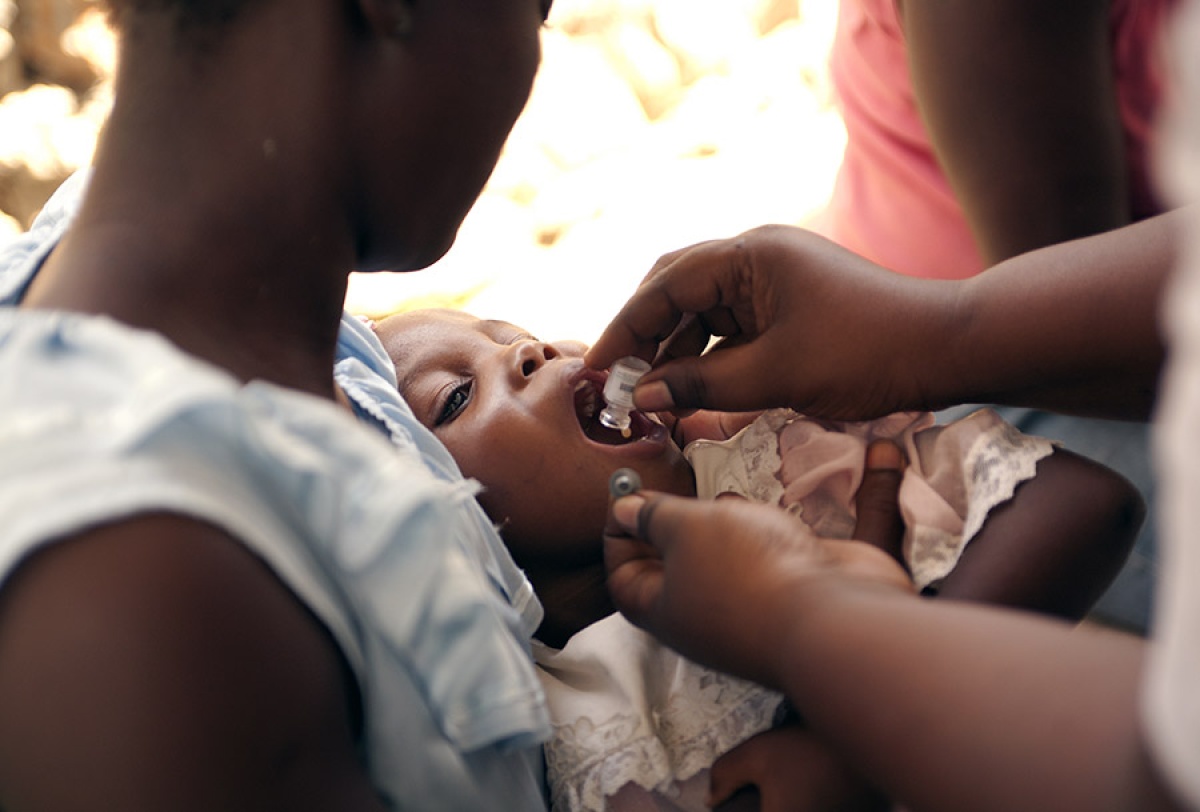Cholera Vaccine Succeeds in Haiti
Posted on Feb 20, 2015

This month Dr. Louise C. Ivers and colleagues publish a paper that shows exactly how much the vaccine Shanchol slowed the spread of cholera in villages north of St. Marc, Haiti, in 2012.
Writing in The Lancet Global Health online, the senior health and policy adviser at Partners In Health finds that Shanchol was widely effective when administered to thousands of adults and children in the region. “We found that there were about 65 percent fewer cholera cases among people that were vaccinated than there were in those that were unvaccinated,” she says.
It’s fantastic news, and not just for the obvious reason that fewer cholera cases means fewer cholera fatalities. ”Effectiveness of reactive oral cholera vaccination in rural Haiti: a case-control study and bias-indicator analysis” also reminds us of the importance of a vaccination campaign that almost never happened. And it paves the way for even stronger efforts to end the epidemic that has killed 8,800 Haitians and infected 20,000 last year alone. “It’s a huge victory,” says Dr. Ralph Ternier, director of community care and support at Partners In Health's (PIH) sister organization Zanmi Lasante (ZL).
As many remember, cholera didn’t even exist in Haiti before 2010. But then the United Nations flew in a group of peacekeepers from Nepal, whose capital had recently suffered a cholera outbreak, and it installed them in a camp with bad plumbing. Leaky sewage pipes and overflowing holding tanks sat on the banks of a tributary of the longest river in the country, the 200-mile Artibonite.
What happened next prompted many stories—stories based on factual evidence or circumstantial evidence or, most commonly, a mixture of both. But the sad conclusion to all is the same. Days later, a young man known to bathe just downstream of the camp suffered bouts of violent diarrhea and promptly became the first Haitian to die of Vibrio cholerae. A month later, cholera had spread to each district in the country, everywhere from the Northern Plain to the Tiburon. A cholera epidemic had exploded less than a year after January’s devastating earthquake. (For more on the U.N.’s role in the epidemic, see Dr. Ivers’s op-ed in The New York Times.)
The staffs at ZL and PIH responded. They mobilized thousands of community health workers, opened cholera treatment wards, ran sanitation and hygiene initiatives, and more. A proposal to administer the new, World Health Organization-approved vaccine Shanchol was also floated.
Exhausted aid agencies, politicized global public health organizations, and some leaders within Haiti were not excited by the idea. Delivering the $1.85-per-dose vaccine didn’t offer enough bang for the buck, they said. Also, Shanchol might have proven useful in countries like India, where cholera has been long-simmering, but it had never been deployed in the confusing midst of an outbreak, so wouldn’t it be better to focus on, say, teaching people to wash their hands properly? “Cholera Vaccine Isn’t The Answer For Haiti,” an NPR blog post declared.
Locals disagreed. PIH/ZL’s community meetings and focus groups made it clear that anyone at risk of dying from cholera preferred using the vaccine. “The community definitely wanted the vaccine,” says Dr. Ternier. And Dr. Ivers, who was PIH’s chief of mission in Haiti at the time, had little interest in parsing critiques—critiques that sounded an awful lot like arguments for the “basic minimum package,” an old public health paradigm that offers only limited care to people in poor countries. (For more on the basic minimum package, see Dr. Paul Farmer’s recent piece in the London Review of Books.)
Like any of her PIH/colleagues, Dr. Ivers wanted to offer the best care. To her mind, that included preventative measures such as handwashing, treatments like rehydration, and using the vaccine. “When you see people dying, you want to do everything you can,” she says.
With the blessing of the Haitian Ministry of Health, PIH/ZL pushed ahead, and after overcoming all sorts of obstacles in distributing the tiny vials—training legions of staff, fighting the axle-gripping mud of rainy season, working around a simultaneous polio vaccination campaign, ensuring 45,417 patients swallowed two doses of the drug two weeks apart—the campaign finished in June 2012.
The critics couldn’t have been more wrong. As an earlier study in The American Journal of Tropical Medicine and Hygiene shows, virtually everyone got the vaccine. An impressive 90 percent of patients in the rice-growing regions of Grand Saline and Bocozel completed the full two doses—hardly a waste of money. And as detailed in the latest study, the vaccine proved just as effective as it has been in, say, India. Fully 63 percent of patients were protected against cholera infection.
“Our study contributes to mounting evidence that oral cholera vaccines have an important role to play as a component of comprehensive, integrated cholera control efforts in Haiti,” the study concludes.
As Dr. Ivers hints, the results of the study aren’t as earth-shattering as might be expected, but rather put a fine point on a cholera-fighting strategy that has become, well, standard. Since the vaccination campaign, the Haitian Ministry of Health, with the support of their partners, administered the vaccine to 300,000 citizens, and the World Health Organization has begun stockpiling the drug for use in future outbreaks.
“We are really happy with the results of this study as it demonstrates that the vaccination campaign really saved lives and reduced suffering,” says Dr. Ivers. “We undertook the campaign as a public health emergency, but having data to demonstrate how effective it really was helps to solidify the case for using vaccines in this kind of setting—and that helps transfer lessons from Haiti to other places where cholera occurs or may appear for the first time. The Haiti cholera epidemic has really reinvigorated the public health community’s efforts to address the problem of cholera, and it’s exciting to be part of the progress that’s being made.”

